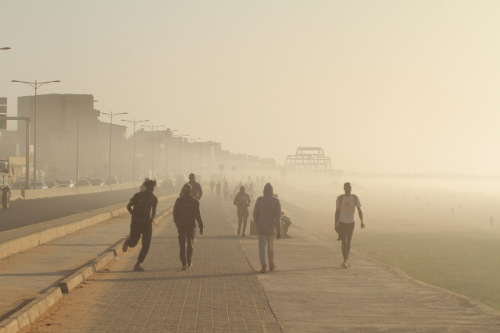Dakar Air Quality Ranks Worst Globally as Dust Storm Engulfs Senegal

TLDR
- Dakar, Senegal’s capital, topped IQAir’s index for worst air quality among major cities this week as a Sahara Desert dust cloud blanketed northern Senegal
- The World Health Organization recommends air quality levels below 45 micrograms per cubic meter, but Dakar’s concentration exceeded 1,000
- The annual Harmattan winds, carrying desert dust across West Africa from November to March, exacerbate respiratory ailments like asthma and bronchitis
Dakar, Senegal’s capital, topped IQAir’s index for worst air quality among major cities this week as a Sahara Desert dust cloud blanketed northern Senegal. On Wednesday, Dakar scored 392, well above the hazardous threshold of 300. The World Health Organization recommends air quality levels below 45 micrograms per cubic meter, but Dakar’s concentration exceeded 1,000.
Visibility in the city dropped below 500 meters, disrupting daily life. Fishing, an economic lifeline, was curtailed as many stayed ashore due to safety concerns. Outdoor activities ceased, with health authorities urging residents, particularly children, the elderly, and those with respiratory conditions, to remain indoors and wear masks.
The annual Harmattan winds, carrying desert dust across West Africa from November to March, exacerbate respiratory ailments like asthma and bronchitis. In Dakar, where lung conditions affect at least 10% of the population, doctors are seeing rising cases among children, reflecting worsening air quality.
You can follow Daba’s reporting on Africa on WhatsApp. Sign up here
Key Takeaways
The Harmattan winds underscore the dual health and economic challenges posed by environmental conditions in Dakar. Dust storms disrupt daily life, curtail income for fishermen, and hinder fitness routines, vital to the city's culture. The rising prevalence of respiratory issues, particularly among children, calls for urgent attention to urban air quality. For a city deeply reliant on outdoor activity and fishing, the effects of these storms extend beyond health to livelihoods, with one day off the water posing significant economic risks. Long-term solutions, including air quality monitoring and public health interventions, are critical to mitigating the impacts of this seasonal phenomenon on Dakar's population and economy.

Next Frontier
Stay up to date on major news and events in African markets. Delivered weekly.
Pulse54
UDeep-dives into what’s old and new in Africa’s investment landscape. Delivered twice monthly.
Events
Sign up to stay informed about our regular webinars, product launches, and exhibitions.




